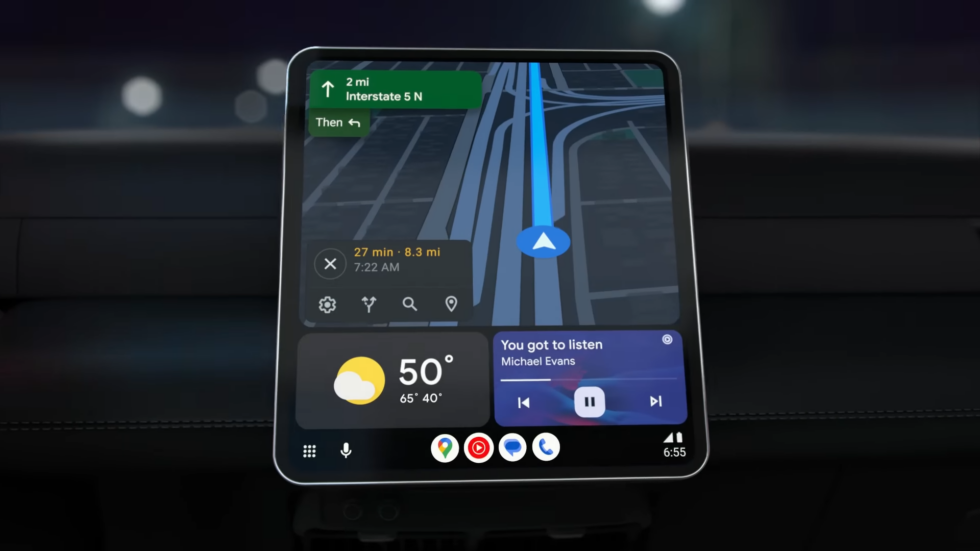-

The new Android Auto is super flexible. Here's a big-screen mode. [credit: Google ]
After a big delay, Google's big revamp of Android Auto is finally here. This new version of Android Auto puts a big focus on a new split-screen interface, which is a lot more flexible than the old, rigid Android Auto display. This update was first shown off at Google I/O and promised in the summer of 2022, but somehow that got pushed back to CES 2023. Car apps have a lot of safety regulations to go through.
Android Auto is an app that lives on your phone and sends a custom interface (wirelessly or wired) to a compatible car's dashboard. Unlike regular Android, which can scale to any size or shape display, Android Auto was originally designed rigidly around a horizontal 16:9 display. It's been updated over the years to be slightly more flexible, but it has always wanted to live in this horizontal, widescreen configuration. Not all car screens are widescreen, though, and for cars like the Volvo XC90, which has a big 4:3 iPad-style screen in the center console, Android Auto was just in a tiny window in the middle of the display. Some manufacturers gave it a letter or pillar box. Apple's CarPlay received a similar flexibility update in iOS 13.
Unlike the old version, the split-screen interface should be able to adapt to any rectangular screen. There are three components: a navigation bar, the main app interface, and a smaller sidebar section that can show one or two additional widgets. These can all be configured in a way that makes sense for the screen's shape. The navigation bar can be on the right side or the bottom. The main app interface can be next to the sidebar section or stacked on top. The sidebar can be a tall vertical strip or a skinny horizontal strip. Some configuration is going to work!
Read 4 remaining paragraphs | Comments
-

The new Android Auto is super flexible. Here's a big-screen mode. [credit: Google ]
After a big delay, Google's big revamp of Android Auto is finally here. This new version of Android Auto puts a big focus on a new split-screen interface, which is a lot more flexible than the old, rigid Android Auto display. This update was first shown off at Google I/O and promised in the summer of 2022, but somehow that got pushed back to CES 2023. Car apps have a lot of safety regulations to go through.
Android Auto is an app that lives on your phone and sends a custom interface (wirelessly or wired) to a compatible car's dashboard. Unlike regular Android, which can scale to any size or shape display, Android Auto was originally designed rigidly around a horizontal 16:9 display. It's been updated over the years to be slightly more flexible, but it has always wanted to live in this horizontal, widescreen configuration. Not all car screens are widescreen, though, and for cars like the Volvo XC90, which has a big 4:3 iPad-style screen in the center console, Android Auto was just in a tiny window in the middle of the display. Some manufacturers gave it a letter or pillar box. Apple's CarPlay received a similar flexibility update in iOS 13.
Unlike the old version, the split-screen interface should be able to adapt to any rectangular screen. There are three components: a navigation bar, the main app interface, and a smaller sidebar section that can show one or two additional widgets. These can all be configured in a way that makes sense for the screen's shape. The navigation bar can be on the right side or the bottom. The main app interface can be next to the sidebar section or stacked on top. The sidebar can be a tall vertical strip or a skinny horizontal strip. Some configuration is going to work!
Read 4 remaining paragraphs | Comments
January 07, 2023 at 04:28AM

Post a Comment